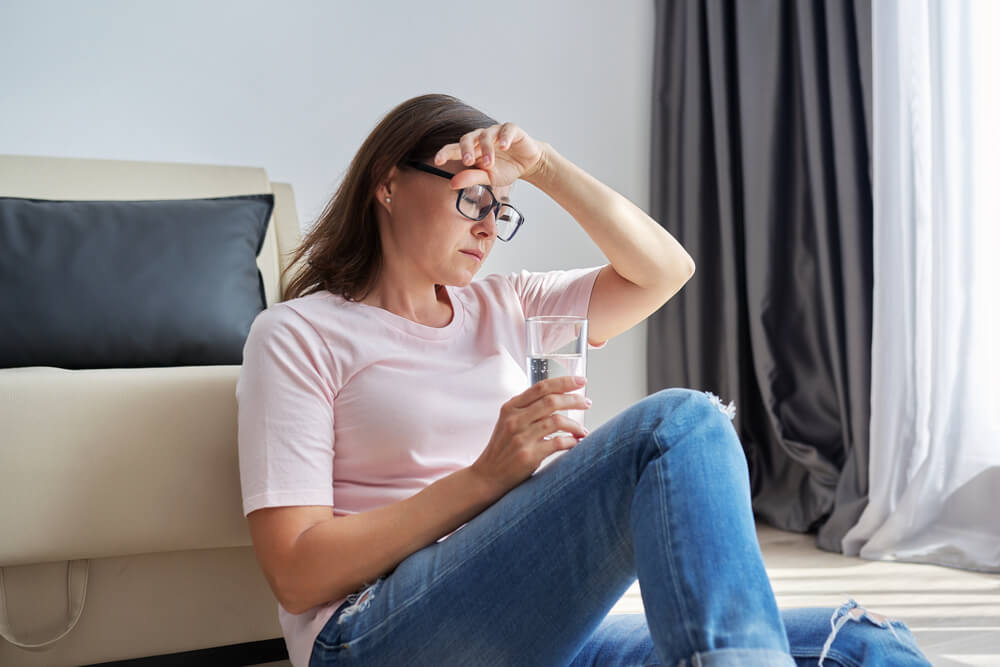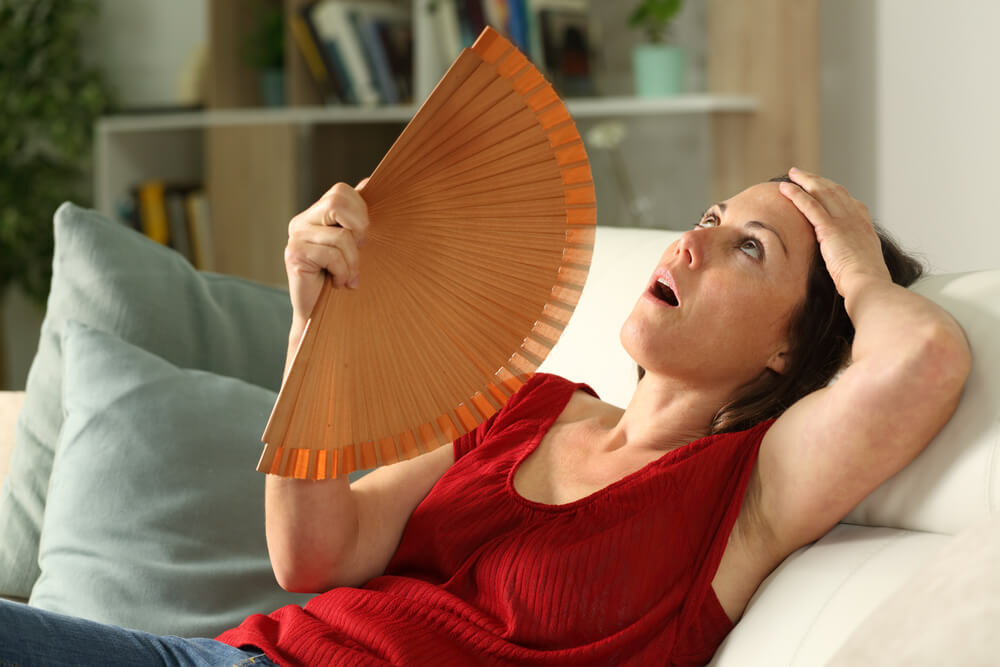What is VMS? Vasomotor symptoms or VMS may occur due to blood vessel dilations and constrictions. The condition mostly affects women who are in menopause and may lead to night sweats, hot flashes, and other uncomfortable symptoms.
More specifically, at around 40 years of age, progesterone and estrogen levels start to drop in women. At this point, the transition to menopause, or perimenopause, will begin. And as the transition progresses, some women may also start having issues with vasomotor symptoms or VMS. Fortunately, there are several menopuase treatment options available that may be able to help women with VMS and other symptoms that cause discomfort.
In this article, the focus will be on VMS. We will discuss what causes VMS and what are the most prominent vasomotor treatment options as well.
What Causes VMS?

Typically, VMS develops due to the dilation and construction of blood vessels. These motions will trigger heart palpations, hot flashes, night sweats, and blood pressure changes. Experts suggest the most likely reasons for these symptoms occurring before and during menopause are the hormonal fluctuations that affect the processes that control temperature control and blood pressure.
Data from the North American Menopuase Society suggests that around 75% of women in the US experience problems with hot flashes during menopause. These flashes will typically develop and happen over a period of six months to two years, but some women may experience them for up to a decade.
Furthermore, menopause will usually begin between the ages of 45 and 58 in the US, with the average age being 52 years old.
Menopause typically occurs approximately 12 months after a woman’s last menstrual period. During perimenopause, which is the transitional phase leading up to menopause, some individuals may already experience symptoms like hot flashes, even while they are still menstruating. Conversely, others might encounter these symptoms after their periods have ceased. It’s important to note that not everyone undergoes these symptoms, and their intensity can vary widely from person to person.
It’s also worth mentioning that menopause onset can happen earlier than the typical age for various reasons. While some women naturally experience early menopause, others may go through it due to factors like surgical interventions, underlying health conditions, or specific medical treatments.
Symptoms
After talking about vasomotor symptom causes, it’s time to talk a bit more about the actual symptoms. At this point, it’s essential to understand that Menopuase isn’t a health condition. Instead, it’s an entirely normal transition that women will experience during their lives, involving hormonal changes that may lead to several uncomfortable symptoms.
Hormones play a significant role in influencing the functioning of the cardiovascular system, as fluctuations in hormone levels can impact the circulatory system’s performance. Additionally, these hormonal changes can disrupt the body’s temperature regulation controlled by the nervous system.
The primary manifestation of these hormonal fluctuations is the occurrence of VMS, with hot flashes being the most common. Hot flashes entail a sudden and intense sensation of heat that can affect the chest, neck, and face. As a result, the skin in these areas may become visibly red.
Apart from hot flashes, women may also experience:
- Sleep problems
- Anxiety
- Heart palpations
- Night sweats and general sweating
For the most part, VMS may affect women for about a year, but a certain percentage may keep experiencing these problems for several years.
If menopause begins as a result of chemotherapy treatments or something similar, most women find that when the treatment is over, the associated symptoms will stop, and menstruation will begin. Still, in some cases, this, unfortunately, won’t happen.
Vasomotor Symptom Causes
We’ve talked about vasomotor symptoms causes above, but not in detail. For the most part, it’s most likely that the hot flashes can be retraced to neurovascular problems, meaning that they are a result of specific changes to the part of the nervous system that controls circulation.
Experts suggest that the flashes are a result of body temperature control changes, and sudden estrogen drops may trigger them, but at this point. It’s still unclear what kind of role the hormone exactly plays.
Some evidence suggests that supplementary estrogen may help relieve vasomotor symptoms, but experts haven’t yet found any direct correlation between symptom severity and hormone level changes.
Also, possible hot flash triggers include:
- Drinking alcohol and coffee,
- Eating spicy foods
- Stress
- Smoking
- Drugs and medical treatments
- Having a high temperature
- Wearing overly warm clothing
- Diabetes, an overactive thyroid, tuberculosis, and other health conditions.
On the other hand, VMS may appear without any obvious triggers.
Vasomotor Sympotm Risk Factors
While VMS is quite prevalent during menopuase, not every woman will experience it. There are some risk factors that may increase vasomotor symptoms, and they are:
- Smoking
- Obesity
- They may be more prominent in Hispanic and Black women than in Asian American or white women, according to the data from the National Institute on Aging.
VMS Complications
Hot flashes and perspiration typically pose no serious health risks; nevertheless, they can cause discomfort and may lead to feelings of embarrassment due to the noticeable nature of these symptoms.
In certain instances, hot flashes may not necessarily be linked to menopause but could be indicative of underlying issues within the nervous or vascular systems. These hot flashes may serve as potential indicators of changes that could potentially result in other health conditions, including cardiovascular disease or dementia.
That said, women should reach out to their healthcare provider if:
- The hot flashes start to interfere with their everyday activities.
- They are experiencing other symptoms as well, such as fatigue, weight loss, diarrhea, or generally feeling unwell.
- They are at risk of other health issues as well, such as thyroid problems or diabetes.
Vasomotor Symptoms Treatment

Usually, doctors will recommend the following for vasomotor symptom treatments:
Hormone Therapy
This treatment balances out hormone levels in the body, helping with relieving hot flashes, among other symptoms. Still, some women may not be recommended these therapies, especially if they are at a higher risk of specific conditions such as some cancers and cardiovascular problems.
Antidepressant Medication
In some cases, vasomotor symptom treatments may include antidepressant medication usage, such as paroxetine. Usually, lower dosages will be prescribed for menopausal women than for depression.
Lifestyle Changes and Remedies
There are also a few lifestyle practices that may help alleviate the problems related to hot flashes during menopause:
- Avoiding the triggers such as caffeine, alcohol, and spicy foods.
- Quitting tobacco use and avoiding secondhand smoke.
- Keeping portable fans nearby.
- Dressing in different layers to get more air when hot flashes start.
- Carrying bottles of ice water and sipping on those when the flashes start.
- Avoiding exercise immediately before going to bed.
- Keeping the bedroom at cool temperatures at night.
- Following a healthy diet.
- Regular exercise.
- Maintaining optimal or moderate weight.
- Practicing relaxation exercises.
Opt For Expert Assistance
Vasomotor symptoms (VMS), particularly hot flashes, are a prevalent aspect of menopause. However, they do not affect everyone and can manifest differently from person to person.
If you discover that VMS significantly disrupts your daily life, it is advisable to consult with a healthcare professional. They can provide guidance on potential treatments or lifestyle adjustments that may alleviate these symptoms and improve your quality of life.
On that note, schedule an appointment at Women’s Health Partners today.


